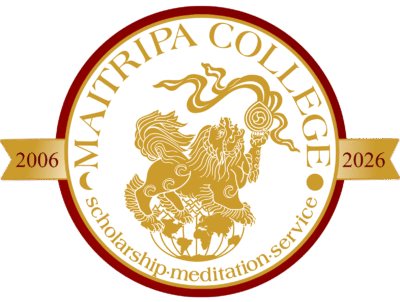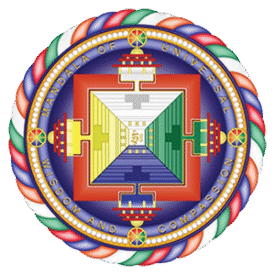A Special Tribute:
With the passing of Jeffrey Hopkins on July 1, 2024, those of us who study or practice Tibetan Buddhism have lost one of our great guiding lights. In the course of his half-century career, he published countless volumes on Tibetan Buddhist thought and practice, especially as seen through the lens of the Geluk tradition – most notably, perhaps, Meditation on Emptiness (Wisdom) and Maps of the Profound (Snow Lion). He befriended H.H. the Dalai Lama, sometimes interpreting for his oral teachings (as during the Kālacakra empowerment near Madison in 1981) and often helping bring His Holiness’s writings to a western audience through collaborative translations. And, he developed the still-vital Buddhist Studies program at the University of Virginia, where he trained several generations of scholars who have gone on to exert great influence in the field, including (to name just a few) Donald Lopez, Anne Klein, Elizabeth Napper, Guy Newland, Georges Dreyfus, Bill Magee, and Paul Hackett.
Among the many things that could be said about Jeffrey’s life and legacy, here are several others that stand out:
– Jeffrey first studied Tibetan Buddhism in New Jersey with Geshe Wangyal, where he also met and studied with Geshe Lhundub Sopa, who was in turn an important teacher to Yangsi Rinpoche. Jeffrey went on to study with Richard Robinson at the University of Wisconsin-Madison, and worked with a number of important scholar-monks in India, especially at Gomang college of Drepung monastery. After Prof. Robinson’s untimely death, Geshe Sopa (who had moved to Madison) oversaw the completion of Jeffrey’s dissertation, in 1973. One of Jeffrey’s earliest publications was a collaborative translation, with Geshe Sopa, of two important Dge lugs pa texts, originally entitled Tibetan Buddhism in Practice and Theory, and later republished as Cutting Through Appearances (Shambhala).
– Over the course of his career, one of Jeffrey’s great contributions to Tibetan Buddhist studies lay in his willingness to let the Tibetan texts and teachers speak for themselves, as much as possible, in the context of modern academia. This went down better with some scholars than others, but Jeffrey stayed committed to this approach throughout his life, and from the evidence of his and his students’ work, it has been very fruitful, indeed.
– Although Jeffrey was best known for his work on the Geluk tradition, he evinced a healthy interest in other Tibetan orders as well; most significant, perhaps, were his works on the shentongpa (other-emptiness) works of Dölpopa Sherab Gyaltsen (Mountain Dharma) and Jonang Tāranātha (The Essence of Other-Emptiness).
– Jeffrey developed a carefully systematized approach to the teaching of the classical Tibetan language. He produced his own Tibetan-Sanskrit-English dictionary (chrome-extension://efaidnbmnnnibpcajpcglclefindmkaj/https://glossaries.dila.edu.tw/data/hopkins.dila.pdf) and inspired the production of accessible language-learning tools by scholars such as Joe Wilson, Bill Magee, and Paul Hackett.
– His and his students’ ongoing work on aspects of the Geluk and other Tibetan scholastic traditions is being carried forward by the Dharma Farm (https://www.thedharmafarm.net/).
We at Maitripa mourn Jeffrey’s passing, while knowing that his memory, and his works, will remain an ongoing blessing, as well as a source of understanding and inspiration, for all of us.
~Roger Jackson, July 3, 2024
Short Bio:
Jeffrey Hopkins, PhD was Professor Emeritus of Tibetan Buddhist Studies at the University of Virginia, where he taught Tibetan Studies and Tibetan language for more than thirty years. He received a BA magna cum laude from Harvard University in 1963, trained for five years at the Lamaist Buddhist Monastery of America (now the Tibetan Buddhist Learning Center) in New Jersey, and received a PhD in Buddhist Studies from the University of Wisconsin-Madison in 1973.
From 1979 to 1989 he served as His Holiness the Dalai Lama’s chief interpreter into English on lecture tours in the U.S., Canada, Southeast Asia, Great Britain, and Switzerland. He has published more than forty books, including Meditation on Emptiness, a seminal work of English language scholarship on Tibetan Madhyamaka thought, as well as translations of works by Tsongkhapa, Dolpopa, and His Holiness the Fourteenth Dalai Lama. At the University of Virginia he founded programs in Buddhist Studies and Tibetan Studies and served as Director of the Center for South Asian Studies for twelve years.
For more:
Listen to the Wisdom Podcast: Jeffrey Hopkins: The Life of a Buddhist Scholar at https://learn.wisdompubs.org/podcast/jeffrey-hopkins/
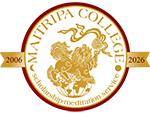
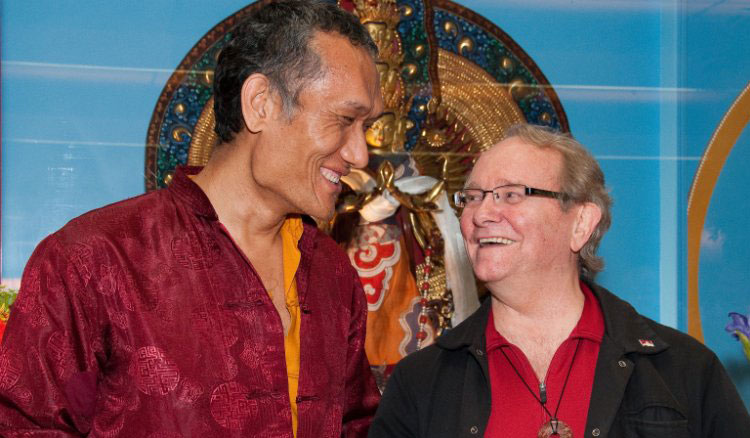 With Maitripa College President Yangsi Riinpoche
With Maitripa College President Yangsi Riinpoche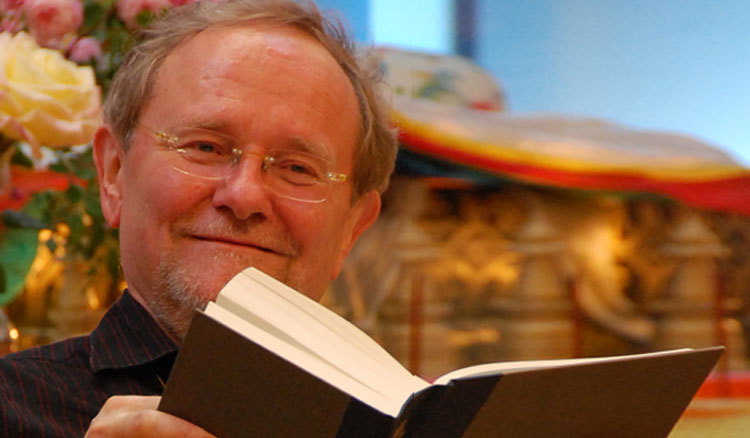 Teaching at Maitripa College
Teaching at Maitripa College Teaching in the Jokhang Meditation Hall.
Teaching in the Jokhang Meditation Hall.